The project Formarsi per formare e innovare la didattica universitaria (Training to teach and innovate university teaching) was launched in June 2023. In addition to the University of the Holy Cross, the following institutions
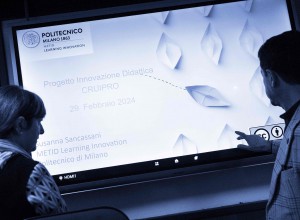
On Wednesday, February 29, 2024, at our University, the last session of the Interuniversity Course on Educational Innovation promoted by CRUIPRO (Conference of Rectors of Italian Universities and Pontifical Roman Institutions) and taught by Professor Susanna Sancassani from the Polytechnic University of Milan was held.
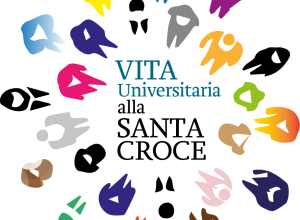
In order to support direct student involvement in university and library activities, two projects have been proposed and implemented with their contribution, which are outlined below.
1. A video aimed at promoting certain library services dedicated to doctoral students, illustrated by those who utilize them on a daily basis.
2. A podcast where students express their opinions on the importance of music in life and in different cultures. A way to offer food for thought and open a discussion in anticipation of the upcoming Study Day
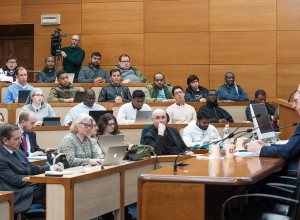
Interest in spirituality among young people is growing worldwide: this is one of the findings of a survey conducted by the Research Group Footprints Research Group. Young People: Expectations, Ideals, Beliefs of the Pontifical University of the Holy Cross, in collaboration with the Spanish polling institute GAD3, which was presented on February 29, 2024, at 10:45 am at the University (Aula Álvaro del Portillo).
The analysis took place during November and
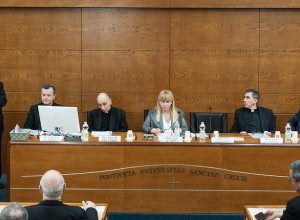
On Thursday, February 29, 2024 (at 4 PM - Álvaro del Portillo Hall), the School of Canon Law has organized a Round Table titled The Duty to Report Crimes of Abuse.
After the introductory remarks by Professor Eduardo Baura of the School of Canon Law, several experts have examined the issue from various perspectives: the civil perspective has been addressed by Professor Roberto Borgonovo, the canonical perspective by Professor Matteo Visioli, and the ecclesiastical perspective by Professor Massimo del Pozzo. Professor Jorge
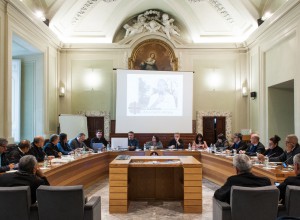
In Rome, a training course promoted by the Pontifical Commission for the Protection of Minors is currently taking place, aimed at bishops, presidents, and directors of Caritas Latin America and the Caribbean on the topic of Safe Church Environments.
One of the sessions of the course, scheduled until March 1st, was held on Tuesday, February 27th, 2024, at the Pontifical University of Santa Croce. This activity is part of the
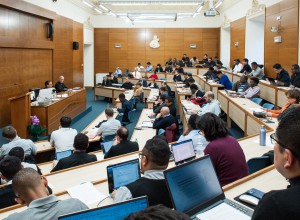
On Thursdays February 22nd and 29th, and March 7th, 2024, (at 3:00 PM, The Great Hall of Pope John Paul II) the Center for Priestly Formation, in collaboration with the Relational Ontology Research Group (ROR), offers a short Course entitled Prevention of Abuses in the Church. Accompanying, Healing, Managing to priests, religious, seminarians, laypeople, and University students.
The lessons are held by professors Ilaria Vigorelli and Francisco Insa
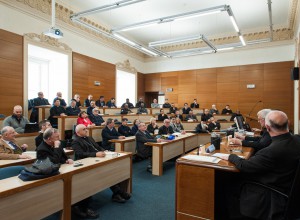
On Thursday, February 22, 2024 (at 11:00 am, in the Aula Minor Álvaro del Portillo), the book Liturgicum Mysterium Colendum Semperque Fovendum was presented, a miscellany offered to Professor Manlio Sodi on the occasion of his 80th birthday.
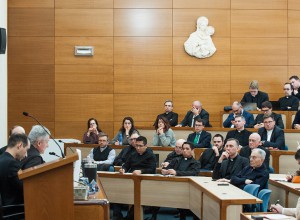
On Wednesday, February 21, 2024 (at 8:45 a.m. in the minor hall "Álvaro del Portillo"), upon the initiative of the Institute of Liturgy, the Study Day The Liturgical Reform between History and Theology 60 Years after Inter Oecumenici (1964-2024) was held.
After the greetings from the Dean of the School of Theology, Philip Goyret, interventions were made by Bishop Vittorio Francesco Viola, Secretary of the Dicastery for Divine Worship and the Discipline of the Sacraments, Sr. Elena Missimi, FMA, of the Pontifical Salesian University, the professor from Santa Croce
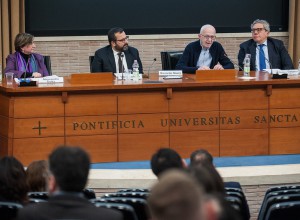
On Wednesday, February 21, 2024 (at 9:30 am, in the Aula Magna Giovanni Paolo II), a new event on communication and migrants took place, titled Migrants and Refugees Between Solidarity and Fear, promoted in collaboration with the ISCOM Association and the Committee on Information, Migrants, and Refugees.
The activity aimed to provide a new opportunity for dialogue among authorities, academics, journalists, and humanitarian organization leaders to focus on the challenges of the media system and to contribute to more accurate information in

